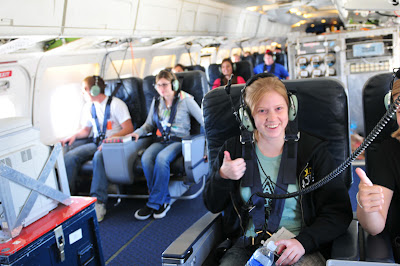On June 30, SARP students, mentors, faculty, and staff flew on the DC-8 for the last two science flights of the summer. Everyone in all three of the research groups had the opportunity to fly on both the morning and afternoon flights (although some decided to pass on the morning flight due to the expected turbulence).
After taking off from Palmdale at 10:30AM, we flew north to the almond orchards and vineyards to acquire MASTER data from 13,000 ft. We then descended to ~1000 ft and collected air samples over Harris Ranch (a feed lot near I-5 with over 100,000 cattle). During the Harris Ranch over-flight, the Whole Air team practiced the sampling strategy that they planned to use for the LAX missed approach during the afternoon flight. Everyone in the Whole Air group had a specific role to play in order to facilitate the rapid collection and recording of the air samples. The practice sampling run went extremely well. SARP participants cheered and clapped loudly as we flew away from Harris Ranch. The pilots later commented that the cheers and excitement they heard from SARP were some of the best they had ever heard from scientists on the DC-8 as a result of collecting data!
Flight track for the June 30, 2011 SARP science flight # 1
Just after 1PM, we flew back to Palmdale, landed, and ate our lunches on the plane on the ground (there wasn’t enough time to get off the plane between the two flights). At 2:30PM, we took off again for the afternoon flight and flew back to the same almond orchards and vineyards to acquire MASTER data at a different time of day. Our pilots then contacted LAX to get us into the pattern for our missed approach. At the preflight briefing, the Whole Air team had explained that they wanted to fly over as much of LA as possible at as low of an altitude as possible. Typically, when commercial airplanes fly into LAX, air traffic controllers assign them a slow, steady descent to minimize turbulence. In our case, we wanted to fly low enough over the city (below ~5000 ft) to collect air samples to measure pollution. The sampling culminated with the missed approach (we flew only ~100 feet over the LAX runway!)
Flight track for the June 30, 2011 SARP science flight # 2
Elevation profile for the second science flight. During the LAX missed approach we were only ~100 feet above the runway
The sampling strategy that the Whole Air group practiced in the morning flight went perfectly during the missed approach. The team was thrilled with the number of air samples they collected near LAX!
After the LAX missed approach, we flew out to the Santa Barbara Channel to image kelp beds with MASTER. We flew back up to 13,000 ft and flew four lines along the coast. As Dr. Fuelberg predicted, the weather was perfect with no clouds below us at all.
Kelp beds in the Santa Barbara Channel
After all of the data was collected, we headed back toward Palmdale, elated with our successful flights! Before landing, however, we had a special treat in store for us! Before the flights, Dan had asked our pilot if it would be possible for us to experience zero gravity in the DC-8. The pilot said that it wasn’t possible, but that he would be able to do 0.5 G’s followed by 2 G’s. After we finished collecting data, we strapped ourselves into our seats and the pilot let us all experience 0.5 G’s (Mars gravity). For a few seconds, we all felt our arms and legs become lighter and were laughing and cheering. However, all good things come with a price! We then had to endure 2 G’s as we leveled out (not a pleasant experience!)
After experiencing 0.5 and 2 G’s!
After the landing and our post-flight briefing, we helped unload the plane and headed back to the hotel. We are so grateful to all the DC-8 pilots and crew who made this incredible experience possible for us over the past week! Tomorrow we drive back to Irvine where we will be located until the end of SARP. After relaxing and resting up over the 4th of July weekend, SARP participants will spend the rest of the summer analyzing the data they collected during the past week!






